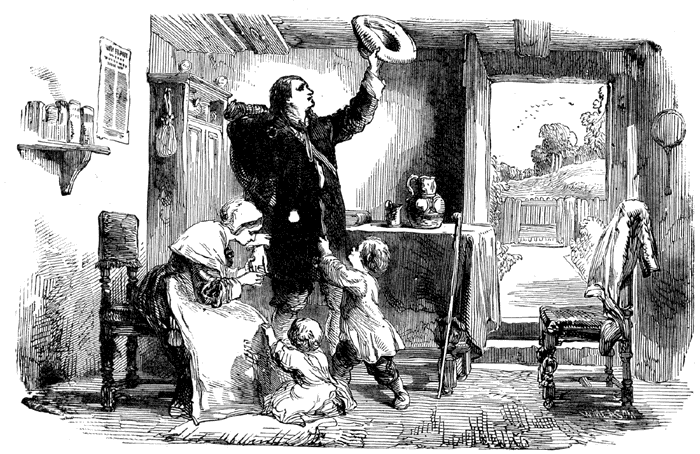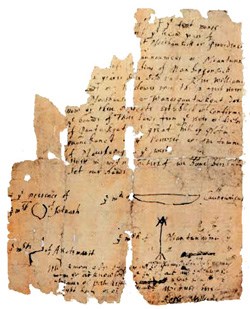|
In his eighty years, Roger Williams lived through dramatic social, political, and religious developments in his immediate and wider community. The changes in the world around him helped shape Williams into an educated leader and formed a complicated political web through the English Atlantic. The colony of Rhode Island was only a small piece of the transatlantic society that created the circumstances for Williams's community to grow. How far removed was Williams from the Protestant Reformation? When did Puritanism develop in New England? What political changes affected New England's Indigenous tribes? How developed was Rhode Island during the English Civil War? Which theologians were Williams's contemporaries and rivals? Establishing a chronology of Williams's world answers such questions, and fits his story into larger-scale English colonial history.

Library of Congress 1524: First documented European contact with the Indigenous peoples of Rhode Island by Giovanni de Verrazano. 1534: King Henry VIII splits from the Catholic Church, creating the Church of England 1536: John Calvin publishes Institutes of the Christian Religion, one of the most important texts of early Protestant theology. Puritans typically shared Calvinist theology. 1542: Global Event - Dominican friar Bartolome de las Casas writes A Short Account of the Destruction of the Indies, reporting the crimes of his fellow Spaniards against the native peoples of the Caribbean and South America. 1559: Parliament passes the Act of Supremacy. The Act established the monarch as the supreme spiritual head of England. The Act also required officials holding public office to swear an oath of spiritual allegiance. 1603: Roger Williams is born in London, England. He is the son of a middle class merchant, and as a young man has the opportunity to study at the University of Cambridge. 1603: Global Event - Tokugawa Ieyasu ends generations of civil wars in Japan and establishes the Tokugawa Shogunate. 1606: William Shakespeare writes The Tragedie of Macbeth, one of his most popular plays. 1618: The Thirty-Years War, one of the deadliest wars in European history, begins. 1620: The Mayflower arrives in Plymouth. The Mayflower transported Puritans - religious reformers within the Church of England - to the English colonies in North America. 1631: The minister Roger Williams and his family flee the religious persecution in England and arrive in Boston, Massachusetts Bay Colony, which the Puritans had settled a year earlier. 
1636: The Massachusetts government banishes Roger Williams for preaching his dangerous political and religious ideas about "soul liberty" and limiting the government's power to only secular matters. 1636: Wampanoags rescue a sickly Roger Williams, who was lost in the wilderness. After he recovers, Williams settles near a fresh water spring in what is today the Roger Williams National Memorial. He names the settlement "Providence." 
1638: Massachusetts banishes the "Antinomian" preacher Anne Hutchinson. She settles on Aquidneck Island and founds the town of Portsmouth. 1639: Eight settlers become the founding officers of the town of Newport on Aquidneck Island. 1642: English Civil War begins. The Puritan Parliamentary forces of Oliver Cromwell go to war with the royal forces of King Charles I. 1643: Massachusetts Bay leaders gather New England officials in Boston to form a mutual defense alliance called the New England Confederation. The alliance of Massachusetts Bay, Plymouth. Connecticut, and New Haven excludes Rhode Island. 1643: Roger Williams returns to England to obtain a patent for Rhode Island and the Providence Plantations. Williams also publishes one of his most famous books, A Key into the Language of America. 1643: Miantonomi organizes a Narragansett army against their longtime rivals, the Mohegans. The Mohegans stop his early invasion, and bring him to Boston for trial. Boston authorities find Miantonomi guilty, and the Mohegan leader, Uncas, executes him. 1644: Roger Williams publishes The Bloudy Tenent of Persecution, one of his most significant works of philosophy. 1644: The English Parliament agrees to grant Rhode Island a colonial patent, incorporating the towns of Providence, Newport, and Portsmouth into a single colony. Roger Williams returns to Rhode Island. 1644: Global Event - The Qing Dynasty begins its reign over China. 1647: Canonicus dies at approximately eighty years old. Massachusetts Governor John Winthrop recorded the sachem's death in his diary. 1648: The Treaty of Westphalia ends the Thirty-Years War. 
1651: Parliament passes the first of the Navigation Acts. The Navigation Acts place serious restrictions on the maritime trade of the New England colonies. 1652: George Fox begins preaching doctrine that evolves into the Religious Society of Friends, commonly known as the Quakers. 1652: Global Event - The Dutch establish their first permanent settlement in modern-day South Africa, beginning a long history of European presence in the region. 1657: The first Quakers to settle in Rhode Island arrive onboard the Woodhouse. 1658: The first group of Jewish settlers arrives in Rhode Island to enjoy the colony's religious freedom. 1660: Charles II takes the throne, restoring royal rule to England after Cromwell's protectorate. 1661: Increase Mather becomes the minister of North Church in Boston. 1663: Roger Williams returns to England again to argue on behalf of a charter for Rhode Island. Charles II signs the charter and formally recognizes the "livlie experiment" of the colony's religious and civic freedoms. 1666: The Great Fire of London devastated the city for four days. The fire destroyed thousands of buildings and an incalculable number of records and documents, but accounts show only a small number of deaths. 
1676: Metacom, or King Philip, dies in battle near modern-day Bristol, RI. The war ends in Southern New England, but unorganized fighting continues in Northern New England. 1676: Mary Williams dies. Colonists begin to rebuild the city of Providence, which was burned during King Philip's War. 1678: Fears in England over a supposed Catholic plot to assassinate Charles II leads to the execution of over thirty Catholics in London. The assassination conspiracy itself likely did not exist. 1683: Roger Williams dies in Providence at the age of 80. Friends, family, and neighbors have a small ceremony and bury his body on his land. Mid-1680s: French Protestants called Hugenots settle in Rhode Island after fleeing persecution in France. 1685: Cotton Mather is ordained a minister and begins his nearly 40-year career at North Church with his father, Increase. 1686: King James II combines the New England Colonies into a single administrative entity called the Dominion of New England. The Dominion and its Catholic governor, Edmund Andros, were widely unpopular in the region. 
Library of Congress 1689: Bostonian Puritans begin an uprising against the Dominion and Governor Andros, and the new monarchs dissolve the Dominion. 1692: The Salem Witch Trials. Magistrates in Massachusetts condemn twenty-one people to death for witchcraft. 1696: The Seaflower transports enslaved Africans to Newport, beginning Rhode Island's long involvement with the Transatlantic Slave Trade. 1698: Samuel Cranston, Rhode Island's longest-serving governor, becomes governor of the colony at age 39. 1698-1699: Royal investigators threaten to revoke Rhode Island's charter for the colony's many violations of the Navigation Acts and other "irregularities." 1699: Quakers in Newport establish the Great Friends Meeting House, which still stands today. |
Last updated: July 5, 2024
